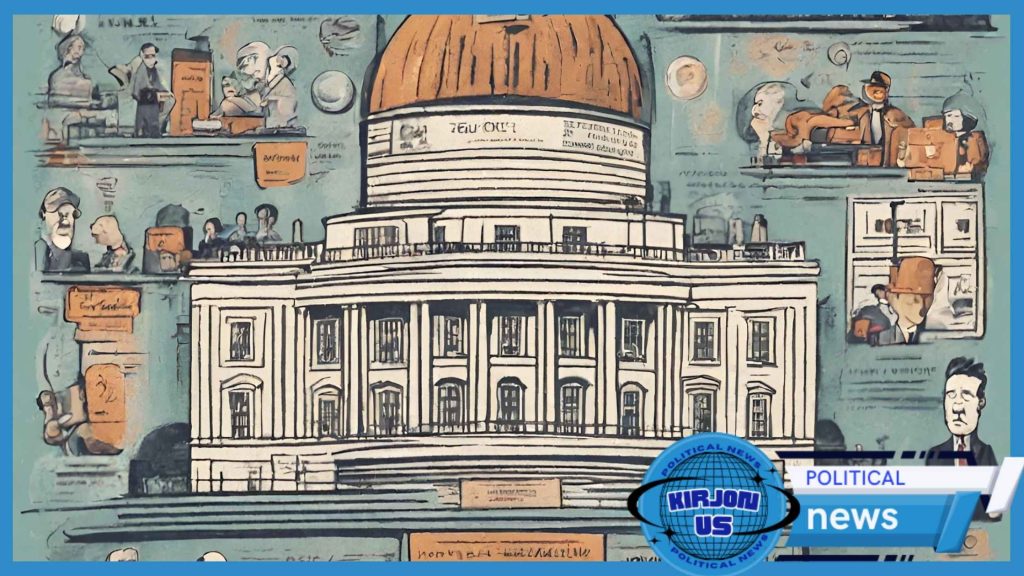Political campaigns are dynamic and multifaceted endeavors that play a pivotal role in shaping the course of governance and public policy. At their core, these campaigns are structured efforts to promote the candidacy of individuals seeking elected office, ranging from local council seats to the highest echelons of national leadership. However, behind the flurry of rallies, speeches, and advertisements lies a meticulously orchestrated operation involving a diverse array of individuals and organizations.
In this article, we delve into the intricate ecosystem of political campaigns, exploring the various roles and responsibilities of those involved. From the candidates who serve as the public face of their campaigns to the strategists and volunteers working tirelessly behind the scenes, understanding the key players in political campaigns is essential to grasping the inner workings of the democratic process.
As we embark on this journey, we’ll uncover the motivations driving individuals to participate in political campaigns, the strategies employed to mobilize voters, and the broader implications for the functioning of democratic societies. By shining a spotlight on the individuals who run political campaigns, we gain valuable insights into the machinery that drives modern politics and shapes the future of nations.
Key Players in Political Campaigns

In the complex world of political campaigns, numerous individuals and organizations play pivotal roles in shaping the course of electoral battles. From the candidates themselves to the strategists and grassroots activists, each participant contributes to the overall success or failure of a campaign. Let’s explore some of the key players in political campaigns:
Political Candidates
At the forefront of any political campaign are the candidates themselves. Whether running for local office or vying for a seat in the highest legislative body, candidates serve as the public face of their campaigns. They articulate their policy positions, engage with voters, and seek to garner support for their candidacy.
Responsibilities of Political Candidates:
- Setting the Agenda: Candidates play a crucial role in shaping the issues and priorities that define their campaigns. They outline their policy proposals and vision for governance, framing the debate around key issues.
- Engaging with Voters: Candidates engage in a variety of activities to connect with voters, including town hall meetings, debates, and door-to-door canvassing. They seek to build relationships with constituents and earn their trust and support.
- Fundraising: One of the primary responsibilities of political candidates is to raise funds to finance their campaigns. They solicit donations from individuals, organizations, and political action committees to cover expenses such as advertising, staff salaries, and campaign events.
Campaign Managers: The Backbone of Campaigns
Behind every successful political campaign is a skilled campaign manager who oversees the day-to-day operations and strategic planning. Campaign managers are responsible for coordinating various aspects of the campaign, from organizing events to managing staff and volunteers.
Responsibilities of Campaign Managers:
- Organizing Campaign Activities: Campaign managers develop and implement strategies to achieve the campaign’s goals, including voter outreach, fundraising events, and media appearances. They create campaign schedules and ensure that activities are executed effectively.
- Managing Staff and Volunteers: Campaign managers oversee a team of staff members and volunteers, delegating tasks and providing guidance as needed. They recruit and train volunteers, assign responsibilities, and maintain morale throughout the campaign.
- Strategic Planning: Campaign managers devise strategic plans to maximize the campaign’s impact and reach its target audience. They analyze polling data, monitor the political landscape, and adjust tactics accordingly to stay ahead of the competition.
Political Consultants: Experts Behind the Scenes

Political consultants play a crucial role in shaping the messaging and strategy of political campaigns. These seasoned professionals offer strategic advice and expertise in areas such as communication, media relations, and voter targeting.
Responsibilities of Political Consultants:
- Providing Strategic Advice: Political consultants offer strategic guidance to candidates and campaign teams, helping them navigate complex political terrain and make informed decisions. They provide insights into voter demographics, polling data, and messaging strategies.
- Crafting Messaging: Political consultants are responsible for crafting the campaign’s messaging and communication strategy. They develop slogans, speeches, and advertising campaigns designed to resonate with target audiences and sway public opinion.
- Utilizing Data Analytics: Political consultants harness the power of data analytics to identify key voter demographics and tailor campaign messages accordingly. They use advanced analytics tools to track voter preferences, predict electoral outcomes, and optimize campaign resources.
The Influence of Political Parties
Political parties play a central role in organizing and supporting political campaigns at all levels of government. From providing financial resources to mobilizing grassroots activists, parties wield considerable influence over the electoral process.
Responsibilities of Political Parties:
- Party Leadership: Political parties are led by elected officials and party officials who oversee the party’s activities and set its agenda. They play a crucial role in selecting and endorsing candidates for elected office.
- Party Committees: Party committees, such as the national and state party committees, are responsible for coordinating campaign efforts, allocating resources, and providing support to candidates. They organize fundraising events, voter outreach initiatives, and party conventions.
- Grassroots Organizations: Political parties rely on grassroots organizations and activists to mobilize support for their candidates and promote party priorities. Grassroots volunteers engage in activities such as door-to-door canvassing, phone banking, and voter registration drives.
Role of Digital Media in Campaigns

In an increasingly digital world, the use of digital media has become integral to political campaigns. From social media outreach to online fundraising, digital platforms offer candidates new avenues to connect with voters and mobilize support.
Responsibilities of Digital Media Teams:
- Social Media Management: Digital media teams manage the candidate’s presence on social media platforms such as Facebook, Twitter, and Instagram. They create engaging content, interact with followers, and amplify the campaign’s message through targeted advertising.
- Online Fundraising: Digital media teams leverage online fundraising platforms to solicit donations from supporters. They design fundraising appeals, track donation metrics, and optimize fundraising campaigns to maximize contributions.
- Targeted Advertising: Digital media teams use data analytics to identify key voter demographics and deliver targeted advertising campaigns. They create digital ads tailored to specific audiences and deploy them across various online platforms to reach potential supporters.
Importance of Fundraising in Political Campaigns
Fundraising is a critical component of political campaigns, enabling candidates to finance their activities and reach voters effectively. From grassroots donations to contributions from wealthy donors, fundraising efforts can make or break a campaign.
Fundraising Strategies:
- Financing Campaign Activities: Funds raised through donations are used to cover essential campaign expenses, including advertising, staff salaries, travel, and event costs.
- Ad Buys and Media Coverage: Candidates invest heavily in advertising to increase their visibility and reach potential voters. Television, radio, print, and digital advertisements are used to promote the candidate’s message and persuade undecided voters.
- Voter Outreach Efforts: Fundraising enables candidates to engage in extensive voter outreach efforts, including door-to-door canvassing, phone banking, and mail campaigns. These efforts help mobilize supporters and increase voter turnout on Election Day.
Volunteers and Grassroots Activists
Volunteers and grassroots activists are the foot soldiers of political campaigns, playing a crucial role in mobilizing support and energizing the electorate. From knocking on doors to making phone calls, volunteers are the lifeblood of grassroots organizing efforts.
Responsibilities of Volunteers:
- Canvassing: Volunteers engage in door-to-door canvassing efforts to distribute campaign literature, gather voter feedback, and persuade undecided voters. Canvassing is a direct and personal way to connect with voters and build support for the candidate.
- Phone Banking: Volunteers conduct phone banking operations to reach voters who may not be reachable through traditional canvassing methods. They make calls to potential supporters, provide information about the candidate, and encourage voter turnout on Election Day.
- Organizing Events: Volunteers help organize campaign events such as rallies, fundraisers, and town hall meetings. They assist with event logistics, recruit attendees, and ensure that the event runs smoothly.
Political Action Committees (PACs)

Political action committees (PACs) are independent expenditure groups that raise and spend money to influence elections and public policy. From advocating for specific candidates to promoting particular policy positions, PACs play a significant role in shaping the political landscape.
Types of PACs:
- Independent Expenditure Groups: These PACs operate independently of candidates’ campaigns and are not subject to contribution limits. They can spend unlimited amounts of money on activities such as advertising, direct mail, and voter outreach.
- Super PACs: Super PACs are a type of independent expenditure group that can raise and spend unlimited amounts of money from corporations, unions, and individuals. They are prohibited from coordinating directly with
Regulatory Bodies and Compliance
In the realm of political campaigns, adherence to regulations and compliance with legal requirements are imperative. Various regulatory bodies at the federal, state, and local levels oversee campaign finance laws and ensure transparency and accountability in the electoral process. Understanding these regulatory frameworks is essential for candidates, campaigns, and political organizations to avoid legal pitfalls and maintain integrity.
Federal Election Commission (FEC)
The Federal Election Commission (FEC) is the primary regulatory agency responsible for enforcing campaign finance laws at the federal level in the United States. Established in 1975, the FEC administers and enforces the Federal Election Campaign Act (FECA), which governs the financing of federal elections, including presidential, congressional, and senatorial campaigns.
Responsibilities of the FEC:
- Monitoring Campaign Finance: The FEC oversees the financial activities of candidates, political parties, and political action committees (PACs) involved in federal elections. It requires these entities to disclose their campaign contributions, expenditures, and fundraising activities to ensure transparency and accountability.
- Enforcing Campaign Finance Laws: The FEC enforces federal campaign finance laws and regulations, investigating alleged violations and imposing penalties for non-compliance. It has the authority to audit campaign committees and levy fines for violations of FECA provisions.
- Providing Guidance and Education: The FEC offers guidance and educational resources to candidates, campaigns, and political committees to help them understand and comply with federal campaign finance laws. It publishes advisory opinions, compliance guides, and other materials to assist stakeholders in navigating the regulatory landscape.
State-Level Election Boards
In addition to federal regulations, individual states have their own election boards or agencies responsible for overseeing campaign finance and election laws within their jurisdictions. These state-level agencies play a crucial role in ensuring compliance with state-specific requirements and regulations governing political campaigns.
Responsibilities of State Election Boards:
- Administering State Campaign Finance Laws: State election boards administer and enforce campaign finance laws specific to their respective states. They oversee the reporting of campaign contributions and expenditures, monitor compliance with fundraising limits, and investigate allegations of misconduct.
- Regulating Ballot Access: State election boards are responsible for regulating ballot access and certifying candidates for election to state and local offices. They establish eligibility requirements, verify petition signatures, and ensure that candidates meet all legal qualifications to appear on the ballot.
- Conducting Elections: State election boards oversee the administration of elections within their jurisdictions, including voter registration, polling place management, and ballot counting. They work to ensure the integrity and fairness of the electoral process and address any irregularities or disputes that may arise.
Campaign Finance Laws and Regulations
Campaign finance laws and regulations govern the raising, spending, and reporting of funds by candidates, political parties, PACs, and other entities involved in the electoral process. These laws are designed to prevent corruption, undue influence, and the appearance of impropriety in political campaigns.
Key Provisions of Campaign Finance Laws:
- Contribution Limits: Campaign finance laws impose limits on the amount of money individuals, corporations, and other entities can contribute to candidates, PACs, and political parties. These limits vary depending on the type of election and the jurisdiction.
- Disclosure Requirements: Candidates, political parties, and PACs are required to disclose their campaign finances to the appropriate regulatory authorities. This includes reporting contributions received, expenditures made, and other financial transactions related to the campaign.
- Prohibitions on Certain Activities: Campaign finance laws prohibit certain activities, such as the use of campaign funds for personal expenses, coordination between candidates and independent expenditure groups, and the acceptance of contributions from foreign nationals or government entities.
Ensuring Compliance
Compliance with campaign finance laws is essential to maintain the integrity of the electoral process and avoid legal repercussions. Campaigns and political organizations must establish robust internal controls and processes to ensure accurate record-keeping, timely reporting, and adherence to regulatory requirements.
Compliance Measures:
- Internal Controls: Campaigns should implement internal controls to monitor and track campaign finances, including the segregation of duties, regular reconciliations, and review procedures to detect and prevent errors or irregularities.
- Training and Education: Candidates, campaign staff, and volunteers should receive training and education on campaign finance laws and regulations to ensure awareness of their obligations and responsibilities. This may include workshops, seminars, or online resources provided by regulatory agencies.
- Consultation with Legal Experts: Campaigns may consult with legal experts specializing in election law to ensure compliance with complex regulatory requirements and navigate any legal issues that may arise during the course of the campaign.
By adhering to regulatory requirements and maintaining transparency in their financial activities, candidates and campaigns can uphold the integrity of the electoral process and build trust with voters. Regulatory compliance is not only a legal obligation but also a fundamental principle of democracy that ensures fairness and accountability in political campaigns.
Conclusion
In the intricate world of political campaigns, a diverse cast of characters plays essential roles in shaping the democratic process. From the candidates who stand at the forefront of their campaigns to the campaign managers, consultants, and volunteers working tirelessly behind the scenes, each participant contributes to the vibrancy and vitality of electoral contests.
Political campaigns are not solitary endeavors but collaborative efforts that require coordination, strategy, and vision. Candidates set the agenda, engage with voters, and inspire support through their leadership and advocacy. Campaign managers serve as the backbone of campaigns, organizing activities, managing resources, and navigating the complexities of the electoral landscape. Political consultants offer expertise and guidance, shaping messaging and strategy to resonate with target audiences and sway public opinion.
Grassroots activists, volunteers, and supporters form the grassroots movement, mobilizing communities, and energizing the electorate through their passion and dedication. Political parties and PACs provide infrastructure, resources, and support to candidates, amplifying their message and expanding their reach.
At the heart of it all lies the commitment to democratic ideals and the belief in the power of collective action to effect change. As we reflect on the myriad individuals and organizations that run political campaigns, we recognize the importance of collaboration, transparency, and accountability in fostering a vibrant and inclusive democracy.
In the ever-evolving landscape of politics, one thing remains constant: the tireless efforts of those who dedicate themselves to the pursuit of a better future for their communities and their country. As we look ahead to future electoral battles, let us remember the invaluable contributions of all who play a part in the democratic process and strive to build a more just and equitable society for generations to come.
Frequently Asked Questions (FAQs)
1. How do political candidates raise funds for their campaigns?
- Political candidates raise funds through a variety of channels, including individual donations, fundraising events, and contributions from political action committees (PACs). They often rely on a combination of grassroots support and contributions from wealthy donors to finance their campaigns.
2. What role do political consultants play in campaigns?
- Political consultants provide strategic advice and expertise to candidates and campaigns, helping them develop messaging, identify target audiences, and navigate the complexities of the electoral process. They often specialize in areas such as communication, media relations, and data analytics.
3. Are there limits on campaign contributions?
- Yes, campaign finance laws impose limits on the amount of money individuals, corporations, and other entities can contribute to candidates, political parties, and PACs. These limits vary depending on the type of election and the jurisdiction, and they are designed to prevent corruption and undue influence in the electoral process.
4. What is the role of grassroots activists in political campaigns?
- Grassroots activists play a crucial role in mobilizing support for candidates and causes at the local level. They engage in activities such as door-to-door canvassing, phone banking, and organizing events to energize the electorate and build momentum for their campaigns.
5. How do regulatory bodies ensure compliance with campaign finance laws?
- Regulatory bodies such as the Federal Election Commission (FEC) and state election boards oversee campaign finance laws and regulations, monitoring financial activities, enforcing legal requirements, and providing guidance and education to candidates and campaigns. They conduct audits, investigate complaints, and impose penalties for non-compliance to ensure transparency and accountability in the electoral process.







